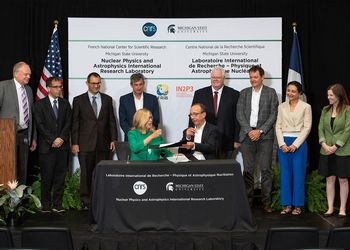New Joint French-U.S. Lab to Advance Nuclear Physics and Astrophysics Research
The International Research Laboratory on Nuclear Physics and Astrophysics is being established at the Facility for Rare Isotope Beams.

Michigan State University and the French research organization, Centre National de la Recherche Scientifique, or CNRS, signed an agreement to establish the International Research Laboratory on Nuclear Physics and Astrophysics during a ceremony in July.
Leveraging FRIB’s world-unique research capabilities, the IRL NPA will be located at FRIB and dedicated to answering fundamental nuclear physics and astrophysics research questions.
The new lab will bring together world-class researchers from France and the United States to stimulate discoveries in fundamental nuclear physics and astrophysics. IRL NPA’s focus is on the researchers’ complementary expertise and the sharing of information and data from current and future experiences.
“We are honored this new laboratory is being established at FRIB to leverage FRIB’s unprecedented discovery potential,” said FRIB Laboratory Director Thomas Glasmacher. “The IRL NPA at FRIB will foster new collaborations and intellectual overlap with world-leading scientists to spur new discoveries that will benefit humankind.”
IRL NPA will focus on questions at the forefront of fundamental nuclear science research along the following four topics:
- Nuclear structure and reactions.
- Nuclear astrophysics.
- Nuclear theory.
- Development of instrumentation for nuclear science research.
With the establishment of the IRL NPA, MSU joins other universities, including the University of California at Berkeley and the University of Tokyo, hosting an IRL dedicated to advancing our understanding of the infinitely small and infinitely large structures of the universe.
MSU has been a place of scientific discovery and a worldwide leader in nuclear science and astrophysics for more than half a century. FRIB and its predecessors have enabled discoveries in nuclear science and atrophysics with accelerated beams of atoms, and MSU has been a top-ranked nuclear physics graduate program for 14 years, according to U.S. News and World Report. The university awards 10% of nuclear physics doctorate degrees each year.



